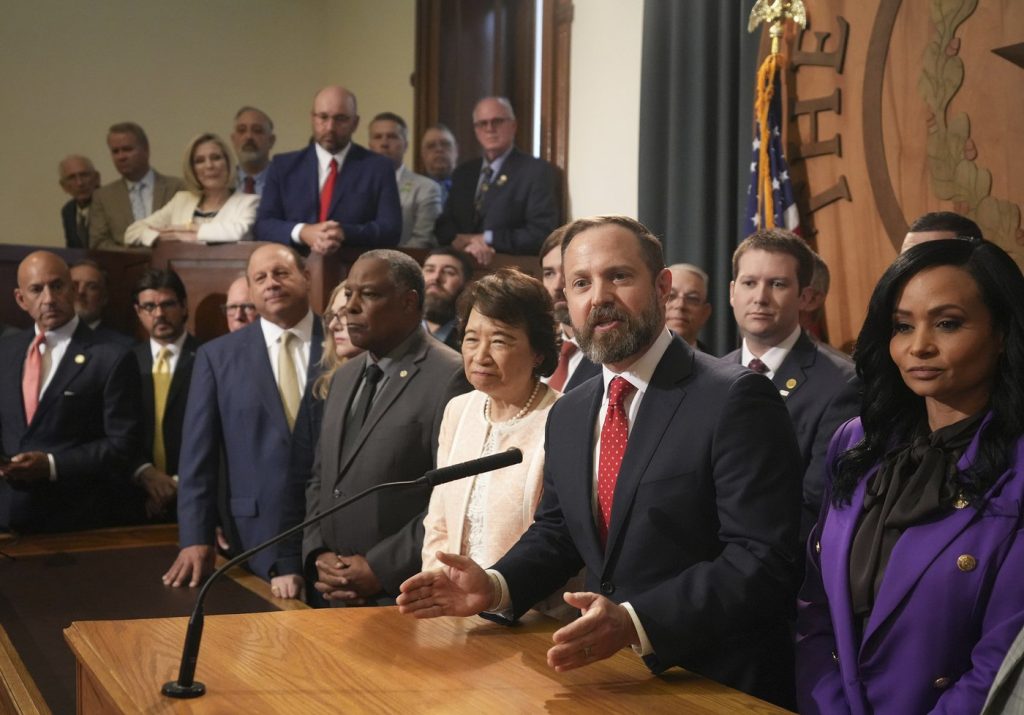AUSTIN, Texas (AP) – California and Texas, the two most populous states in the United States, are engaged in a political struggle ahead of the 2026 elections, which may significantly impact Washington's power dynamics and challenge President Donald Trump's agenda during his second term. In Texas, on a recent Monday, Democrats successfully halted the progress of a redrawn congressional map aimed at capitalizing on the Republican advantage for the upcoming midterms, as Trump's national standing continues to wane.
In response, California's Democratic leaders, galvanized by Governor Gavin Newsom, are exploring new congressional maps that could potentially eliminate five Republican-held seats while reinforcing Democratic incumbents in critical battlegrounds. This move is strategically designed to counter Republican gains in Texas, possibly swinging control of the House in favor of Democrats and providing a counterbalance to Trump in Congress.
A draft proposal suggests that California Democrats aim to increase their representation from 43 to 48 seats out of 52, necessitating approval from both lawmakers and voters. This effort might be met with skepticism, given the past decision to delegate redistricting authority to an independent commission.
The ongoing rivalry between California and Texas highlights a broader contest over jobs, innovation, and political ideologies, with California leaning progressive and Texas conservative. The tension escalated in Texas when a mass exodus of Democrats left the state, causing the Republican-controlled House to fail to meet the quorum required for legislative action. Governor Abbott has threatened to deploy state troopers to arrest absent lawmakers, while Democrats accuse him of employing tactics that overstep his authority.
The Texas House further escalated the situation by issuing civil arrest warrants for absent members while Abbott's administration sought to financially penalize lawmakers who did not attend. This conflict reflects a larger national issue concerning Trump's authority and the delicate balance of power between federal and state governments.
The crux of the dispute revolves around Trump's objective to secure five additional GOP-friendly congressional seats in Texas, which would bolster Republican chances in the upcoming midterms. The current partisan composition has Republicans holding 25 of the state's 38 seats, which is a larger advantage than the results of the 2024 presidential election, where Trump garnered 56.1% of the votes compared to Joe Biden's 42.5%.
The California initiative seeks to target specific districts held by Republican representatives, effectively redrawing boundaries to enhance Democratic voter density and shift the political landscape in their favor. Democratic leaders are actively discussing this proposal, which is being considered alongside Newsom's dedication to partisan redistricting. He has stated that he would refrain from moving forward unless Texas halts its plans.
Newsom has announced plans for a special election in early November, where voters will decide on a new congressional map proposed by the Democratic-led Legislature. He emphasized the importance of safeguarding democracy against perceived Republican tactics aimed at consolidating power. In support, New York Governor Kathy Hochul expressed solidarity with Texas Democrats, condemning what she termed a "modern-day stagecoach heist" to describe the Republicans' actions and underscoring the necessity of fighting back against what she views as unfair political maneuvering.
As the situation develops in Texas, the Democratic lawmakers who fled the state have not indicated when they might return, highlighting the severity of their resistance. Texas House Democratic Caucus leader Gene Wu mentioned their commitment to prolong their absence if necessary, although the precise nature of their strategy remains unclear. Previous legislative walkouts have generally postponed bill passage, as seen in 2021 when Texas Democrats left for 38 days to protest voting restrictions that Republicans eventually enacted upon their return.
With Democrats holding 62 seats in the 150-member Texas House, the absence of 51 lawmakers currently poses a significant challenge to the Republican majority. Historical precedents have shown that while such legislative tactics can delay action, they often do not ultimately prevent the passage of contentious bills, as Republicans have demonstrated through imposing daily fines for absences and clarifying their ability to compel attendance through the Texas Supreme Court's ruling.










